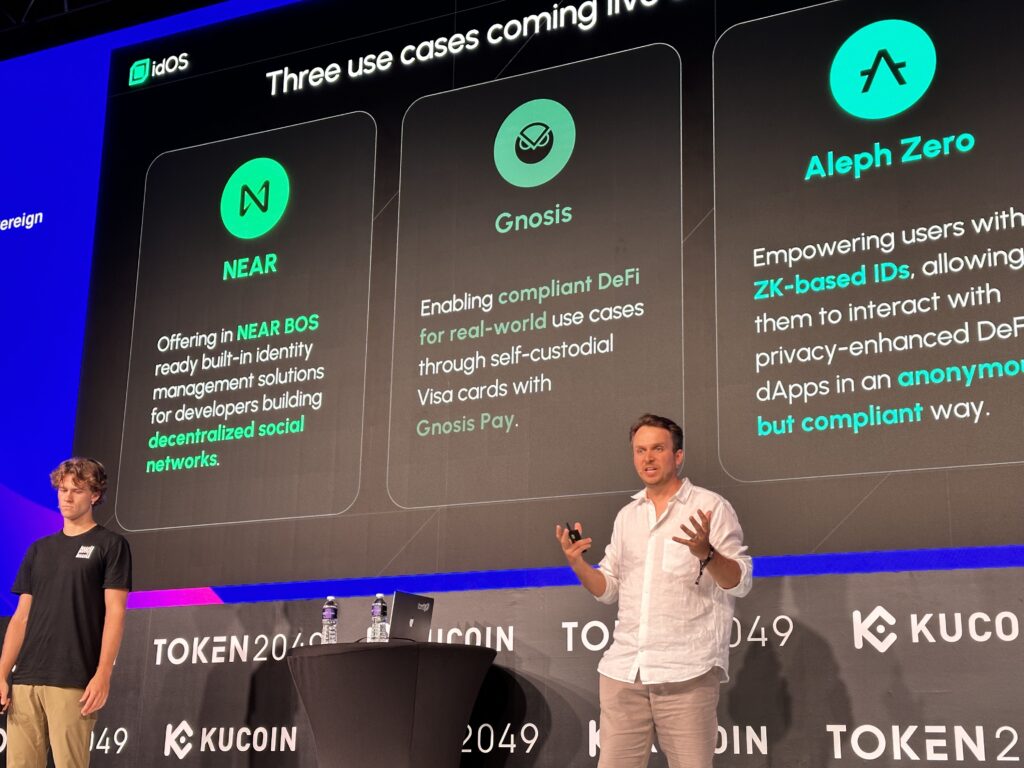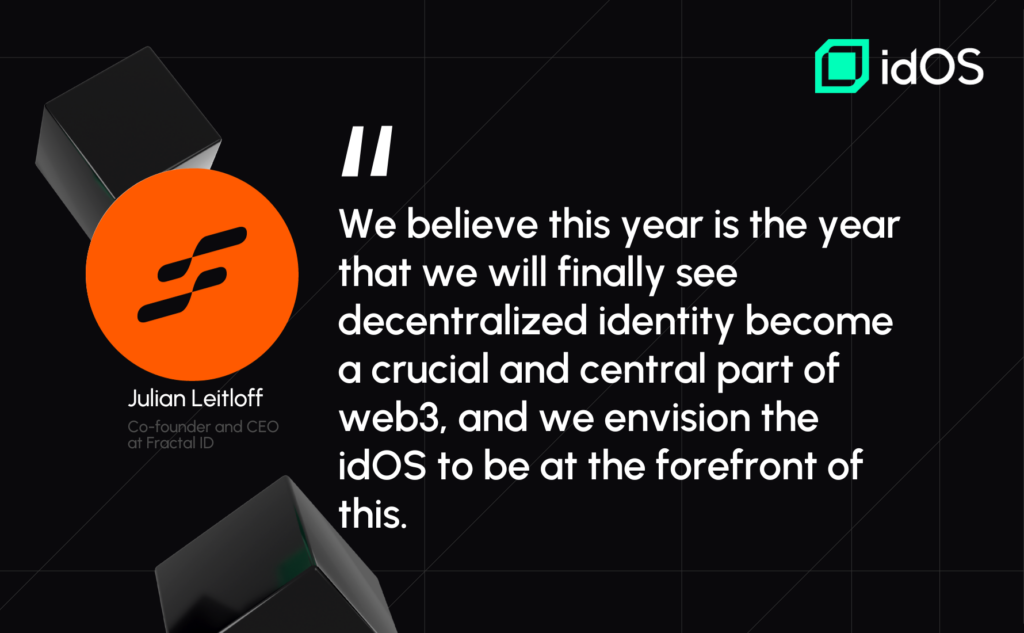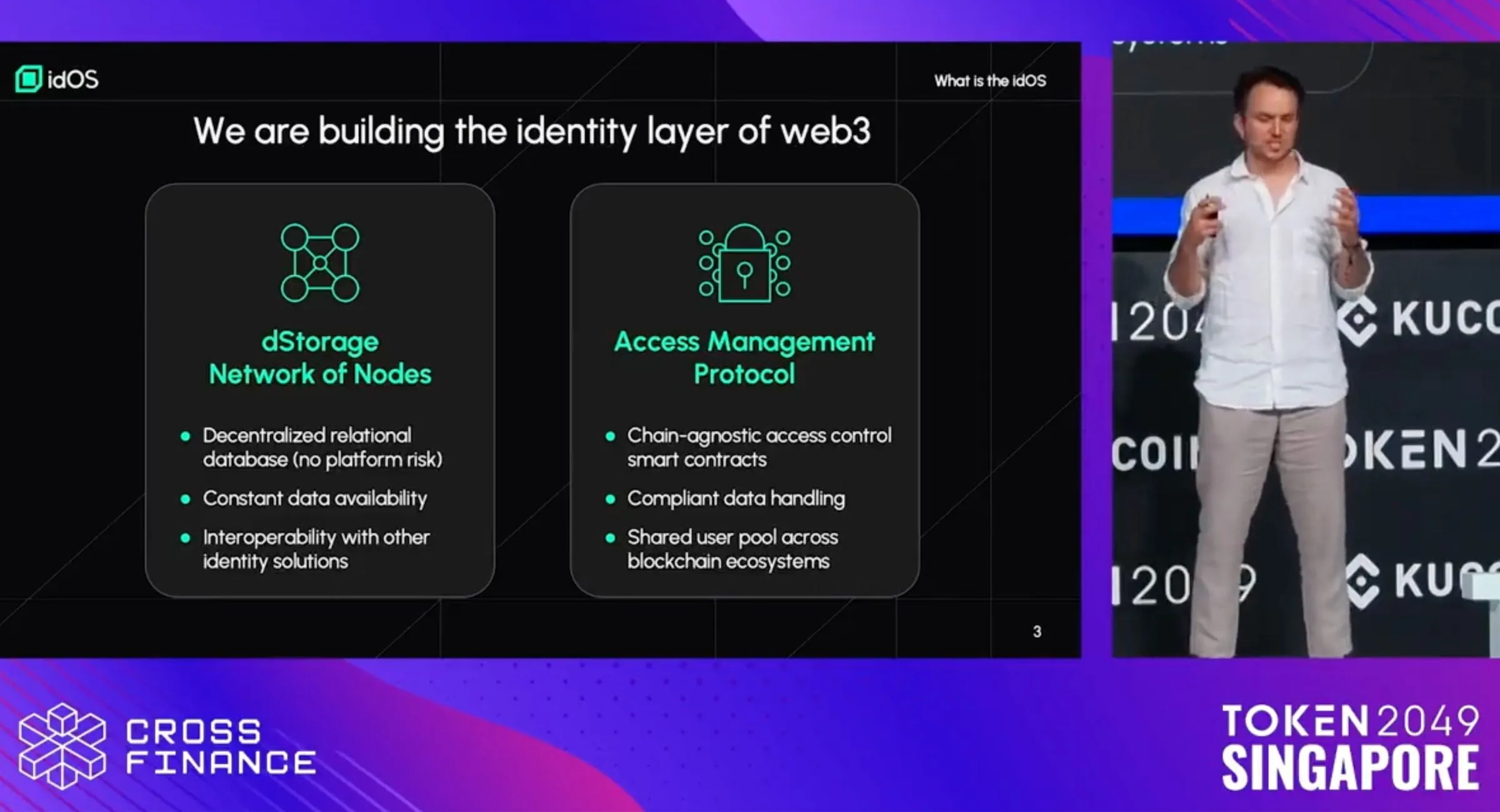Introduction
Faced with interoperability hurdles, compliance requirements, and mounting regulatory scrutiny, the future of the decentralized web faces a crucial question – the need for a robust identity infrastructure. Unlocking practical, real-world use cases means building a user-owned, privacy-preserving identity layer. The ultimate aim? Empowering individuals with complete ownership over their identity data across dApps and blockchain ecosystems, thereby fueling scalable user adoption.
Julian Leitloff, Co-Founder and CEO of Fractal ID, recently took the stage at Token2049 Singapore to unveil the idOS – an open-source, composable, and interoperable solution designed to serve as the identity layer of web3. Developed by Fractal ID in collaboration with Aleph Zero, Kwil, NEAR, and Gnosis, the idOS is guided by the principles of chain-agnostic design, compliance, self-sovereignty, and decentralization to solve key challenges of identity management across web3.
In this blog post, we shed light on the key arguments put forth by Julian about the idOS, what makes it a key infrastructural necessity to fuel growth in web3, and the use cases it’s set to empower.
Read on!
What is the idOS?
The idOS is a composable, decentralized storage and access management solution to enable self-sovereign identity management across web3. Its decentralized storage of nodes allows for user data to be online even when the user is offline. Its access management protocol puts users in control of their data in a self-sovereign way while ensuring compliance.
Who is building the idOS?

Key stakeholders in the web3 space have been talking about identity for the longest time. Everyone has heard about it, however, we are still waiting to see it in action. Web3 still lacks an identity layer which is necessary to unlock real-world use cases. That’s why at Fractal ID, it was very important for us to start with solid partners like NEAR, Gnosis, Aleph Zero, and Kwil to build an identity layer for web3. However, the idOS isn’t just limited to Fractal ID. Rather, it is about having more building partners and ecosystems come together to make decentralized adoption a reality.
What use cases will the idOS enable?
We are quite proud to have leading web3 projects on board to build the idOS as a collaborative effort. Together with NEAR, we are building a quite UX-focused use case for the idOS – namely a decentralized social network with decentralized identity built in that can be easily forked you. Gnosis Pay has a totally different use case where we are taking a fully obligated entity like a financial institution and equipping it with the possibility of having reusable KYC right from the get-go. Aleph Zero is super privacy-focused and we are building something that will enable privacy-preserving DeFi. More details on this will be revealed soon.
Where does the idOS fit into the broader web3 identity ecosystem?
Julian: When it comes to the broader blockchain ecosystem, users have isolated standards and ways to identify themselves in each ecosystem, and that is what has held back the adoption of decentralized identity – the complexity. The ecosystem does not have cross-chain availability and is subject to limited data availability because if the users are offline, mostly, the data is offline as well. Most of these things are also not compliant from a privacy perspective and from a financial regulation perspective.
This is where the idOS steps in. The idOS works cross-chain – EVM and non-EVM. The data is available even if the user is offline, and it’s compliant. Moreover, one major thing is that it’s interoperable. It’s a composable stack that other identity companies and standards can actually work on so that we can reduce the complexity and build a joint user pool. For instance, if someone is onboarded onto NEAR, they can reuse it for getting a credit card on Gnosis. We can also build additional features like analytics on top of it that can be available cross-chain, and we can use different standards, like the Polygon ID standard, or the Circle Identity standard.

Co-founder of Kwil on the relevance of the idOS at TOKEN2049.
Brennan: The best way to think of the idOS is it is what the ERC20 standard did for DeFi but applied to identity. The critical breakthrough of the ERC20, which caused the DeFi wave created an easy piece of infrastructure and a process for companies to launch fungible tokens and to be in compliance with regulations. This helped them get to the market quicker, which allowed them to grow their businesses. Those exact same standards are what we are bringing with the idOS and what these initial adopters are already able to leverage.
What are the next steps?
The idOS will have an MVP launch in November with real dApps that will have implemented it on the ecosystem level. We’re talking about a system that is cross-chain so it can still be used in EVM environments, and non-EVM environments using the same data – you don’t need to fork it. You can also use it as a CRM because when users come to you, you don’t need to download the data and throw it into your web2 AWS databases where the data grows stale. Instead, you can leave it where it is. You don’t even need to trust us to keep the idOS running – the only thing you need to do is take a look at the protocol, run a node, and join the ecosystem to become one of the building partners to build an analytics tool, or a user acquisition tool on top of it. We believe this year is the year that we will finally see decentralized identity become a crucial and central part of web3, and we envision the idOS to be at the forefront of this.

TL;DR
- The idOS is a composable, decentralized storage and access management solution to enable self-sovereign identity management across web3.
- Fractal ID has partnered with solid partners like NEAR, Gnosis, Aleph Zero, and Kwil to build an identity layer for web3. However, the idOS isn’t just limited to Fractal ID.
- When it comes to the broader blockchain ecosystem, users have isolated standards and ways to identify themselves in each ecosystem which has hindered the adoption of decentralized identity.
- The idOS works cross-chain – EVM and non-EVM. The data is available even if the user is offline. It’s compliant and interoperable.
- The idOS will have an MVP launch in November with real dApps that will implement it on their ecosystem level.
Watch the full keynote address here: https://www.youtube.com/watch?v=ZtdDg0N7n4Q
Explore more about the idOS — the identity layer of web3 — on the website, Social Media, GitBook, and GitHub.
